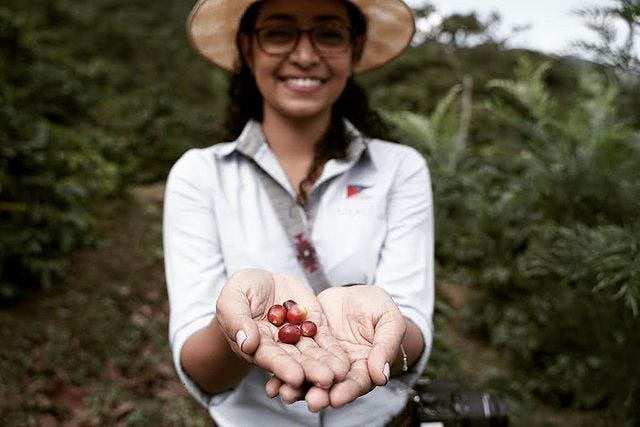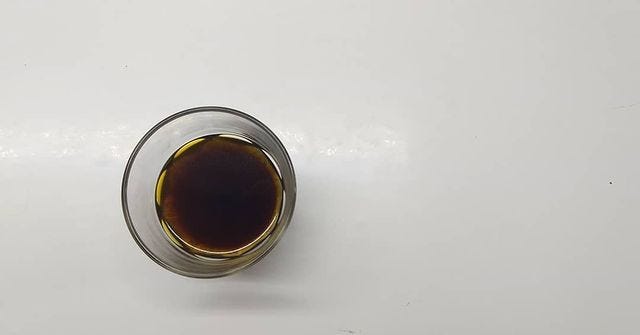GUEST POST: Ana Sofía Narvaez Wants to Move Away from the "Poor Farmer" Narrative
Guest host Ana Sofía Narvaez is highlighting a new wave of coffee producers—and challenging the way we talk about coffee-producing countries
We’re now in the final week of the Boss Barista takeover. For this project, I’ve invited coffee creators, fans, and drinkers to make an episode of a podcast and share it on this channel. To accompany their audio, each creator has also written or contributed to a companion article, shared on the Thursday after their episode goes out.
Ana Sofía Narvaez took over as guest host this week, interviewing Sara Corrales from Finca Los Pinos, a certified organic farm in Nicaragua. Their talk focused on growing the specialty coffee movement in Nicaragua, as opposed to exporting the most valuable coffees out of the country. I asked Ana why this is important, who the new wave of coffee farmers are, and how they’re already changing the way we buy and consume coffee.
Ashley: Why is talking about in-country consumption important?
Ana: As an industry, we are always keen to learn about the coffee one drinks at a favorite coffee shop, to understand if it was sourced transparently and sustainably. But we don’t always stop to think about how people consume the very same product they produce.
Coffee professionals, of course, get a broader view of what happens in coffee-producing countries—but we still have a gap when it comes to coffee consumption, and often some judgment, too.
Therefore, I think internal coffee consumption is a political, business, and cultural topic. We as coffee-producing countries need to push for creating spaces where people can learn about the products and the quality we export. Coffee consumption boosts economic development, creates more jobs, gives farmers or its citizens more power over [their coffee]. It changes power dynamics and social constructs.
Coffee consumption also changes culture, opens the room for deep and thoughtful conversations, new ideas, business ideas, and creativity. It gives joy and pride to its people. We need people in coffee-producing countries to know what coffee is worth; it isn’t just the farmer’s duty and responsibility.
A growing internal consumption also demands more knowledge and trained professionals. Coffee beyond the farm—yet still in our same country.
Ashley: It seems like there’s a new wave of young producers and coffee professionals changing how coffee is sold. What is different about this moment in time?
Ana: Yes. It is a movement led by women, coffee families, and farmers. More people are looking at coffee beyond the farms, seeing opportunities by transforming the raw material (coffee beans) and adding to its value, to be therefore consumed in its home country.
Fifteen years ago, specialty coffee was a lifesaver, letting people stand out, earn more, and become recognized farmers. That is still the case. However, there is also innovation. Farmers are learning new ways to process the coffee, new varieties, and cupping their coffee. Finally, coffee producers are tasting their coffee! There is a long way to go, but it is a good start.
In the main cities, there is a boom of coffee shops diversifying their menus. For example, adding cappuccinos, lattes, espresso when the “normal thing” was only black coffee (think of a dark-roasted coffee with two spoons of sugar). This new menu requires new equipment and technical skills. There are education efforts led by roasteries and coffee shops, sharing the difference between commercial coffee and specialty coffee. The farmers are telling their stories.
There is an emphasis on brewing methods as well, e.g. French press or filter coffee. Just the basic concept of “filtered coffee” challenges people’s idea of coffee, and its drinking rituals. They are not used to coffee being so complex and fun.
There is a coffee community hosting events such as barista championships and cupping events, to share what the country offers. There are places for the curious and people ready to share about coffee.
Ashley: What was your most transformative coffee moment?
Ana: This is a difficult one. On the one hand, realizing being born into a producing family gives me a very unique perspective of coffee, which has allowed me to see the beauty and also the not-so-perfect side of coffee. My most transformative moment has been to realize that as a woman and a professional, I can create spaces where I can participate, that through education and life decisions, these spaces can be opened for other women. If we want to see a different and more progressive industry, we need education that transforms these communities where coffee is produced.
Ashley: My favorite quote from the interview is when you say, “I was sharing once that when I see a cup of coffee, I do not think about the roasted beans, I do not think necessarily about the flavor. I think about the hands behind the coffee, the producers, the cherries, the community that is directly impacted by that farm because it is a business, not just a farm.” It seems like shifting that perspective is important to you?
Ana: Yes, this is very important. Thanks to the environment where I grew up and the mentality of my father when managing his farm, I have seen that coffee is more than a crop that connects us and gives us good experiences—it is a business, after all. Like any other business, it has a direct impact on the life of the coffee grower, his family, his children, and the community. Coffee plantations are the oxygen of many communities, many families depend on this beyond just the one directly involved. When coffee thrives, the rest follows.
I see the human side of coffee. I think of the producer who managed to pay for the education of his children, the food. I think of the families who were able to go on vacation because it was a good harvest. I think of the children who will or will not have a better future thanks to coffee. I think about food, economic, and emotional security, the peace of mind that comes from knowing your job will cover what you need to live a decent life.
We thus need to move away from the “poor farmer” narrative and start acknowledging they are “business partners” regardless of the farm size, culture, language, and location. Side note: I shared this once here:
Ashley: You and Sara talk a lot about community and shifting away from the idea of competition. How has that changed the way you see and consume coffee?
Ana: It is tricky. I think the more we share, give, and learn together, the better we will become. There is not a manual. We as a community need to write those guidelines and create that moral compass. By seeing how Nicaraguan coffee consumption is changing and growing, it made me realize I can be more vocal about my knowledge, that it starts with my family and my friends. I am conscious I won’t change the whole world, but one person at a time is more achievable. When it comes to consuming it, paying for the coffee, that’s as simple as giving the coffee shops, the farmer, what they think it’s worth. Trying and tasting the coffee to have my own opinion on it. Not being biased.
On the production side, I see young people and farmers willing to share, experiment, and learn more from each other. Competition is hard, but farmers don’t compete among themselves—they also compete with other Central American countries. When we share, we learn and/or avoid making the same mistake. In Nicaragua, there are no organizations or institutions that really have a wide reach to share knowledge about and a national strategy to uplift the coffee industry, so we must share among ourselves to thrive and survive. So, the focus must be on what makes us different, and how we can do it together, how we can scale it up and replicate it.
Ashley: What are some of the hurdles impacting coffee consumption in Nicaragua?
Ana: There are a few.
First, much of the coffee consumed does not meet the export or health criteria. People don’t know they are drinking mold and bacteria because these are hidden behind the dark roast profile.
There is a deep-rooted consumption of instant coffee because it is cheap and easier to prepare. People in the countryside usually drink coffee (instant coffee) with bread because it is the only thing they can afford to have for breakfast in the morning, so buying better coffee would be a luxury. Can you blame them? I don’t think so.
There is no education. While the specialty coffee segment is doing a great job, there is no education on what a good, clean, and hygienic coffee looks and taste like. I sometimes ask people: Would you add a rotten tomato to your salad? Would you cook a bowl of rice that has mold? The answer is a resounding no. However, there is no such understanding with coffee. Coffee is not often seen as a food product.
Ashley: Why did you want to tell this story?
Ana: I wanted to take this opportunity to shed light on this issue that is important to me—it is growing and will revolutionize the coffee industry in my country. I wanted to take advantage of this space to also do it with young women who are at the forefront, who are the new face of coffee, whether on the farm, in a coffee shop, or in some other position within the chain where there is not so much participation.
Nicaragua is going through difficult times economically and democratically speaking, but despite these crazy times, there are good things to share. I hope that all Nicaraguans who listen to this episode feel proud of their country and of what we do with coffee.
Ashley: What other stories do you think still need to be told?
Ana: Plenty.
I think there is a lot to explore, and it all depends on the focus. If we talk about coffee-producing countries, I think it is necessary to tell stories of people changing the course of things, innovating, developing communities. It is necessary to continue understanding the human side of coffee, and to go beyond romanticizing it. Cover the cultural aspect and do a deep dive into the country. Coffee is also political, and we don’t talk much about it. We shouldn’t be blinded by the sensory experience. I recently just shared that coffee tastes oftentimes better because of a country’s history, not due to its profile or roasting curve.
The stories of women and men who have been key to the development of their communities have yet to be told. Farmers are the glue that keeps us together.
This interview has been lightly edited for clarity and consistency.
Special thanks to Chobani for making the Boss Barista takeover possible.






